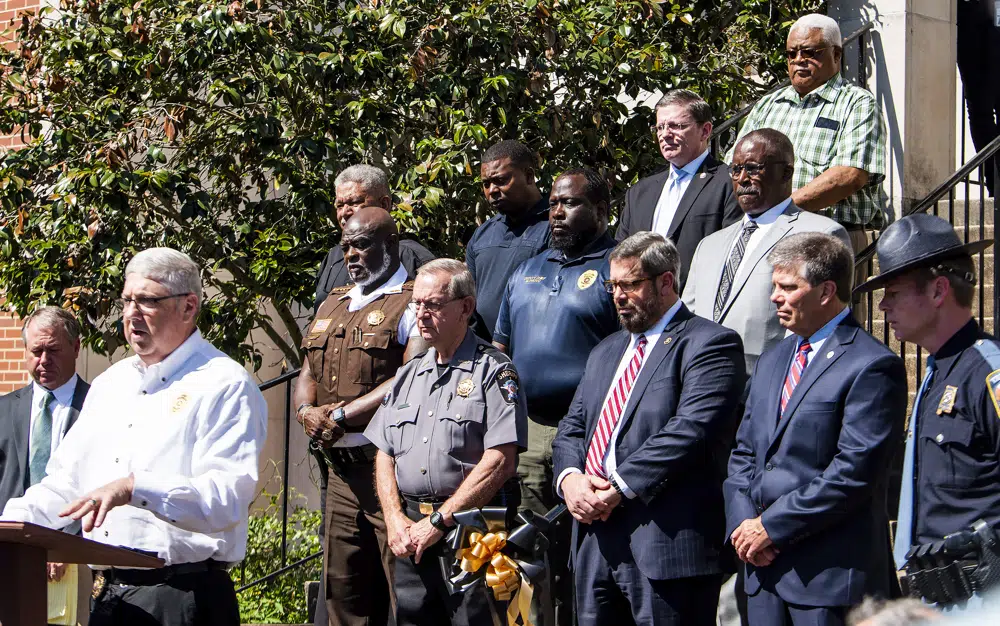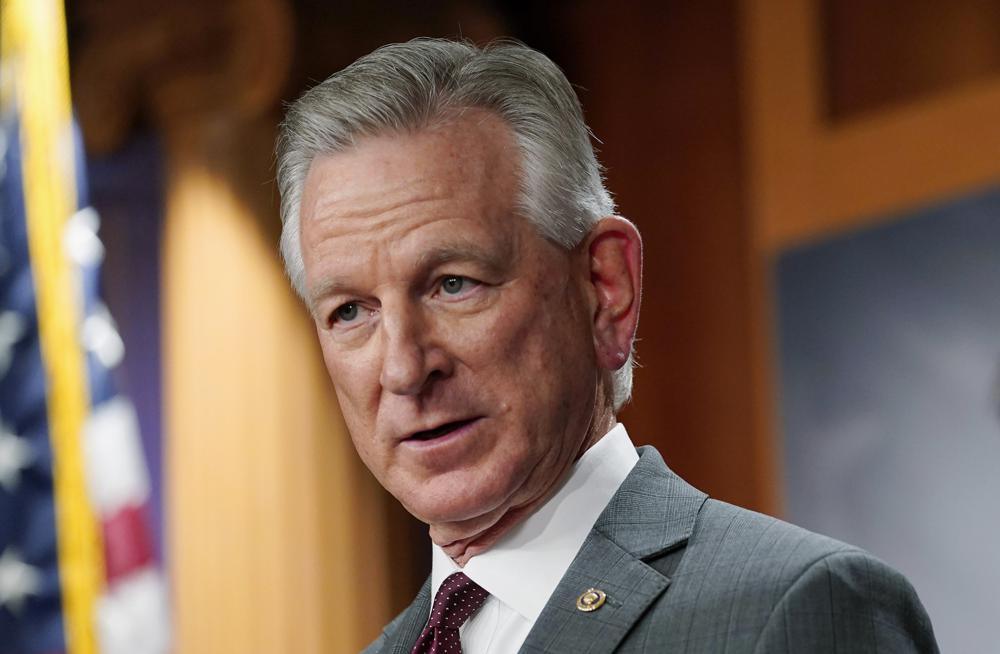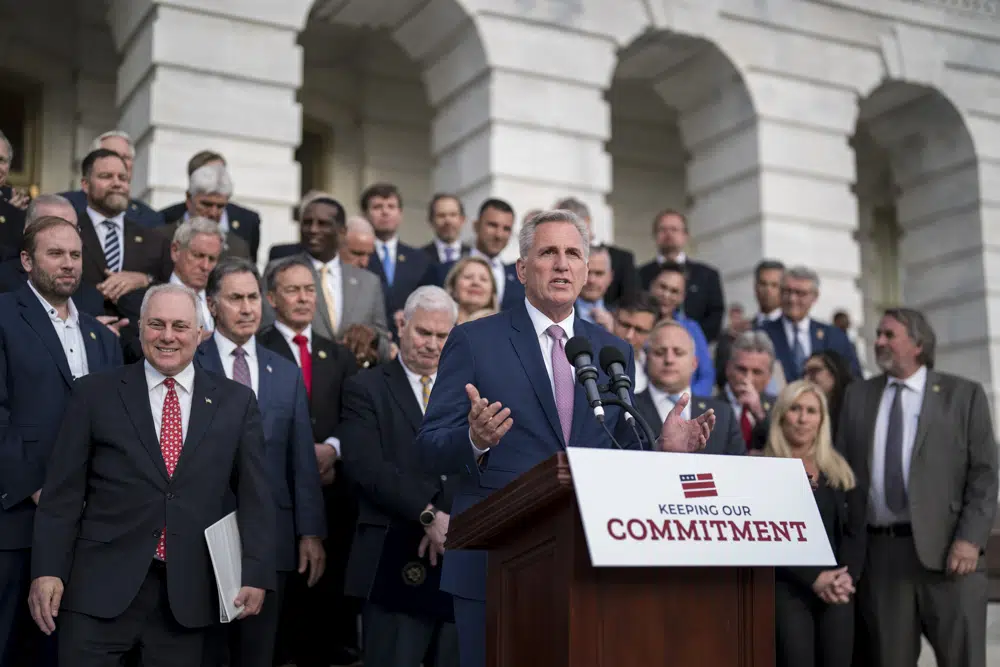Alabama teens charged with murder in Sweet 16 party shooting

Two teenagers have been arrested and charged with murder in connection with a shooting that killed four young people at a Sweet Sixteen birthday party, Alabama investigators announced Wednesday. Tallapoosa County District Attorney Mike Segrest said the pair — Ty Reik McCullough, 17, and Travis McCullough, 16, both of Tuskegee — would be tried as adults. That’s automatically required in Alabama for anyone 16 or older charged with murder. Sgt. Jeremy J. Burkett of the Alabama Law Enforcement Agency wouldn’t say where the two are being jailed, or whether they were already in custody when they were charged late Tuesday. Authorities did not specify if they were related. “We can’t get into a motive right now, because that would be part of an ongoing investigation,” Burkett added. “We can’t share that.” Segrest said prosecutors would ask a judge to hold them without bail. A bond hearing must be held by Friday under Alabama law. Online court records do not show any previous adult charges in state court for either of the arrested teens. Saturday’s violence shocked Dadeville, a sleepy town of 3,200 about 45 minutes north of Tuskegee. The shooting was the 16th mass killing of the year in the United States. A 17th took place in Maine on Tuesday. A total of 88 people have died in the killings so far in 2023. A mass killing is defined as when four or more people were slain, other than the perpetrator, according to a database maintained by The Associated Press and USA Today in partnership with Northeastern University. The birthday girl’s brother, 18-year-old Philstavious “Phil” Dowdell of Camp Hill, died in his sister’s arms. He and another victim, 17-year-old Shaunkivia Nicole “KeKe” Smith of Dadeville, were high school seniors. Families were left planning funerals instead of graduation celebrations. Also killed were Marsiah Emmanuel “Siah” Collins, 19, of Opelika, and Corbin Dahmontrey Holston, 23, of Dadeville. Another 32 people were wounded, and Segrest said four are still in critical condition. He said more charges would be coming. “We’re going to make sure every one of those victims has justice, not just the deceased,” Segrest said, speaking to reporters from the steps of the Tallapoosa County courthouse. A family member of KeKe Smith was thankful for the arrests. “It don’t make the hurt any easier. But we are relieved that they (the suspects) are not out in the community,” Amy Jackson said in a phone interview Wednesday morning. Alexis Dowdell’s birthday party was being held at a dance studio just off the town square. Witnesses said multiple people began shooting some time after her mother paused the celebration to ask people with guns to leave. “It’s Lexi’s 16th birthday party, Sweet Sixteen,” Segrest said. “There’s uncut cake and unburned 16 candles that never got lit. Lexi’s brother was one of the victims. On her 16th birthday party, she knelt by her brother as he took his last breath.” Alexis Dowdell told The Associated Press on Monday said her brother pushed her down onto a blood-slick floor during the shooting. “I guess he tried to push me out the door as fast as he could.” She and her mother, Latonya Allen, ran away but returned to find Phil Dowdell bleeding to death and fading in and out of consciousness. Phil Dowdell was a star wide receiver with plans to play college football at Jacksonville State University. Smith was a talented athlete who became a team manager after she was sidelined by a knee injury. Collins was a 2020 Opelika High School graduate who planned to start college in the fall after taking a year off to try his hand at music. Holston was a 2018 Dadeville High graduate and former athlete at the school. Segrest said dozens of teens from multiple nearby towns attended the party, spreading trauma across the region like a “wave.” “There were so many kids in this venue, and what they saw, they’re victims in this,” he said. “Their families are victims of this.” The district attorney said that grand jurors typically meet in Tallapoosa County in March and September, but he said he would recall grand jurors to seek an indictment before September. “If we can establish the facts and are ready to present that, we will be asking our grand jury to come back in,” Segrest said. This was the first police news conference since Sunday. The Alabama Law Enforcement Agency had said only that shell casings from handguns had been found, noting that there was no evidence a high-powered rifle was used. Burkett again appealed for information from attendees and the public. In 2020, Alabama had the fifth highest rate of gun deaths in the country, according to the U.S. Centers for Disease Control and Prevention. “Somebody’s got to start thinking about Mama because I know I’m tired of it, and everybody behind me is tired of it,” Burkett said. “We’re tired of going to the mothers and having to tell them that these kids are not coming home.” Republished with the permission of The Associated Press.
Speaker says that Alabama will not pass recreational marijuana in the next four years

Alabama will have medicinal cannabis being sold as soon as the end of the year, but there are no plans to consider passing recreational cannabis in this session or even in the next four years. That was the message Speaker of the House Nathaniel Ledbetter told reporters following Tuesday’s legislative day. A reporter asked Ledbetter if the state would consider passing recreational marijuana. “That won’t come for years,” Ledbetter said. “That won’t come for the next four years….because the Speaker won’t let it on the floor.” In 2021 the Alabama Legislature passed – and Alabama Governor Kay Ivey signed – medical cannabis legislation. The legislation created the Alabama Medical Cannabis Commission (AMCC). The AMCC was tasked with writing rules for creating a limited Alabama-only medical cannabis industry. The Commission is formally considering applications from 90 firms and individuals who hope to become licensed Alabama medical cannabis growers, transporters, processors, dispensers, or integrators. The Alabama statute is highly restrictive, but there have been calls from some conservative groups to make that even more restrictive. Some conservative groups want to introduce legislation requiring women of childbearing age to obtain a negative pregnancy test before filling their monthly doctor-recommended medical cannabis order. That legislation is expected to be filed this week. There have also been calls for some in the industry to go in and tweak the 2021 legislation to allow more permits to be awarded or more medical conditions to be included as being treatable by medical cannabis. Ledbetter said he expects the Legislature to “tweak” the statute. Ledbetter did not say what tweaks he thought were likely. Thursday will be the fourth annual lobbying day for the Alabama Cannabis Coalition. The group will meet in Room #429 of the Alabama State House. They will host guest speakers and discuss the current decriminalization legislation, SB42, sponsored for the fourth year by Alabama State Senator Bobby Singleton, and HB13, aka “Cite and Release,” sponsored by Alabama House Rep. Chris England. The group favors both decriminalization of marijuana offenses and the legalization of marijuana, including home growing and the legalization of recreational marijuana. Tuesday was day 11 of the 2023 Alabama Regular Session. The regular legislative session is limited by the Alabama Constitution of 1901 to no more than thirty legislative days during a regular session. To connect with the author of this story or to comment, email brandonmreporter@gmail.com.
Senate to Vote on Tuberville resolution overturning the VA’s abortion policy

On Wednesday, the U.S. Senate is expected to vote on a resolution to overturn a U.S. Department of Veterans Affairs rule that turned VA medical facilities into de facto abortion clinics. U.S. Senator Tommy Tuberville will lead a bipartisan group of Senators in voting for the resolution he co-authored. In February, Senator Tuberville and Congressman Michael Cloud introduced a bicameral resolution of disapproval under the Congressional Review Act (CRA) to reverse the rule. “Using our VA medical facilities to provide taxpayer-funded abortions is illegal and wrong,” said Sen. Tuberville. “The VA’s new policy is a blatant violation of federal law. It forces taxpayers to fund abortions at VA facilities. And it provides limited conscience protections for doctors and nurses with religious objections to performing abortions. This rule is wrong on every level, and a bipartisan majority in Congress will stand up to overturn it.” The resolution has 35 Senate cosponsors and 51 cosponsors in the Republican-controlled U.S. House of Representatives. The resolution has been endorsed by Susan B. Anthony Pro Life-America, Heritage Action for America, National Right to Life, Catholic Vote, United States Conference of Catholic Bishops, Concerned Women for America Legislative Action Committee, Family Research Council, Family Policy Alliance, and March for Life Action. “I agree that the Department of Defense’s policy is atrocious, and it is a departure from a decades-long understanding of federal public policy,” said Sen. John Thune. SBA Pro-Life American wrote on Facebook, “Thank you, Senator Thom Tillis, for joining Senator Tommy Tuberville in standing against DOD’s illegal new policy funding abortion travel with taxpayer dollars.” The United States Conference of Catholic Bishops wrote on their website: “Abortion is a marginal practice, neither performed nor accepted by most health care providers; it does not improve (and can even jeopardize) women’s life and health; and American law has recognized for decades that it is not “just another medical procedure.” Far from being integral to our health care system, abortion is something that supporters seek to impose on that system by force of law.” Before the vote, Senator Tuberville will lead a bipartisan group of senators to urge passage of the resolution at a press conference. On September 9, 2022, the U.S. Department of Veterans Affairs (VA) announced its intention to begin providing abortion services for veterans and their dependents through the taxpayer-funded VA healthcare system. This seemingly blatantly violates Section 106 of the Veterans Health Care Act of 1992, which explicitly prohibits the VA from providing abortion services. Tuberville joined a letter with 38 colleagues following that announcement denouncing the decision. Tuberville says the policy defies an existing statute limiting abortions at VA facilities. Tuberville is in his first term representing Alabama in the U.S. Senate following his 2020 election – defeating incumbent Democrat Senator Doug Jones. To connect with the author of this story or to comment, email brandonmreporter@gmail.com.
Governor Kay Ivey signs legislation to give patients the right to receive visitors

On Tuesday, Alabama Governor Kay Ivey signed legislation into law that protects the rights of hospital and nursing home patients to receive visitors. “The ability to visit a cherished loved one, whether in a hospital or nursing home, should be a fundamental right,” Ivey stated. However, all over the country, during the pandemic, many family members, caregivers, and even clergy were denied access to visit and provide emotional support to patients in healthcare facilities. Such restrictions defy the norms of a caring society, and I was pleased to sign this legislation to signal that in Alabama, we support our patients having this fundamental right.” Senate Bill 113 (SB113) is sponsored by State Sen. Garlan Gudger. It was carried in the House by Rep. Debbie Wood. Senate Bill 113 requires healthcare facilities to adopt specific visitation policies. The bill provides that patients have a right to visitation and can designate an essential caregiver. It also guarantees that the caregiver has visitation rights. “I supported that bill,” said Speaker of the House Nathaniel Ledbetter. “It is only fair.” Thousands of Alabamians have died without their loved ones present since COVID restrictions began in 2020. “I would hate to know that I couldn’t visit my loved one,” Ledbetter said. Rep. Wood explained that patients could change their caregivers while in the hospital. For example, one adult child could be the designated caregiver on one day and their sibling on the next. Wood also said the bill prohibits a healthcare facility from requiring visitors to show proof of vaccination. They are also prohibited from banning consensual physical contact between visitors and patients. The Alabama Department of Public Health (ADPH) will be tasked with requiring healthcare facilities to provide visitation policies to the Department of Public Health. That visitation policy cannot be more restrictive than the policy that the hospital has for its staff. ADPH will develop a mechanism for complaints to be lodged and will have a page on its website that explains the visitation rights law. SB113 also provides for certain immunity from liability. A doctor may, in certain circumstances, exempt a psychiatric care facility from the visitation requirement. The bill is named after Harold Sachs – the longtime Chief of Staff of the Alabama Republican Party. Sachs was diagnosed with COVID-19 and pneumonia in late 2020. His condition deteriorated quickly, and after a few weeks, he passed away. Sachs’ family – like many Alabama families- were not allowed to visit Harold in the COVID-19 ward. The Sachs family for their efforts in getting the bill passed. The bill also was amended to include the name Ann Roberts in the title. Ann Roberts was the wife of State Sen. Dan Roberts. She lost a long battle with COVID-19 in 2021. SB113 passed the Alabama House of Representatives 100 to 1. SB113 has already passed the Senate on a 33 to 0 vote. Wednesday will be the 12th legislative day of the 2023 Alabama Regular Legislative Session. The Alabama Constitution limits the legislature to no more than thirty legislative days in a regular session. To connect with the author of this story or to comment, email brandonmreporter@gmail.com.
Florida bill could ban special codes for firearms, ammo purchases

A new bill is making its way through the Florida Legislature that would prohibit payment processors from discriminating against businesses and citizens who sell or purchase firearms and ammunition in the Sunshine State. House Bill 221 prohibits credit card companies and banks from assigning special codes to categorize firearms businesses while prohibiting the use of a registry that would keep a record of legal gun owners. It is similar to a Mississippi bill that was signed into law by Gov. Tate Reeves on April 13. The International Standards Organization, based in Switzerland, recently approved a new code to categorize firearm and ammunition merchants separately from general sporting goods retailers. Firearms and ammunition sales have been classified as sporting goods, which was sufficient for a payment company to process. The legislation says it is the right of an individual to bear arms and is guaranteed by the Second Amendment of the U.S. Constitution and Article 1 of the Florida Constitution and that the ISO-approved code violates those rights. The ISO code is able to “flag” firearm and ammunition transactions it deems suspicious, done so to allegedly predict and prevent future gun violence. Those wanting to purchase a firearm in Florida must undergo a criminal background check, a current state law requirement for firearm and ammunition retailers before they make a sale. This a requirement that will remain in place, even once Florida becomes a full constitutional carry state this coming July. Lawmakers argue that criminals generally purchase firearms illegally using untraceable cash and cryptocurrency, so credit card companies monitoring legal gun owners does not make a lot of sense. HB 221 states that there is no way for the ISO code to distinguish between what are suspicious purchases and what are not — whether those sales included a firearm or if they were only general merchandise sold from a firearm retailer. Firearm retailers and purchasers could be added to a registry — a move that is prohibited by the bill, with the rationale being that law-abiding citizens could be harassed, profiled, and cut off from financial institutions because they choose to own a legal firearm. Furthermore, the private information of legal gun owners could end up in the hands of criminals. The bill further adds that it is not the role of financial institutions, unelected bankers, and foreign organizations to determine the development of regulations for the sale of firearms and ammunition, which enables a person to exercise their Second Amendment right. If enacted, the law will take effect on July 1, and any agreements or contractual provisions that violate the public policy of Florida — including the use of the ISO code — would become void and will be investigated by the Department of Agriculture and Consumer Services or the State’s Attorney, who have authority to take administrative action. Republished with the permission of The Associated Press.
Kevin McCarthy preps House GOP debt deal to draw Joe Biden into talks

Speaker Kevin McCarthy convened House Republicans behind closed doors Tuesday to build support for his plan to allow the nation’s debt limit to rise in return for strictly limiting future federal spending increases to 1% a year. It’s a bid, including other major policy changes, to draw President Joe Biden into negotiations. The typically fractured House Republican majority has appeared surprisingly open to the plan, which McCarthy outlined in a high-profile speech Monday on Wall Street, but it remains a work in progress. While the proposal has almost no chance of passage in the Democratic Senate, McCarthy wants to pass it in the Republican House to kickstart White House talks. “I’m confident we’ll have it and comfortable we’ll pass it,” said Rep. Tom Cole, R-Okla., the chairman of the Rules Committee, who said a bill could come up for a vote as soon as next week. Even some of McCarthy’s skeptics from the House Freedom Caucus — including those who initially refused to back him to be speaker — seemed ready to give his debt ceiling proposal a look. But others remained deeply skeptical, showing the limits of the embattled speaker’s grip on his majority. Rep. Matt Gaetz, R-Fla., a McCarthy holdout for speaker, said Tuesday he was unsold on the plan and suggested changes. And Rep. Clay Higgins, R-La., said as he exited the session, “There is no ‘this.’ We’re discussing what the ‘this’ will be.” The nation’s legal debt limit must be raised soon to keep the U.S. from defaulting on its fiscal obligations. That high-stakes fight will play out in the weeks ahead as Biden confronts the new era of divided government with Republicans in charge of the House and eager to flex their majority power. If McCarthy succeeds in having the House pass his proposal, he would be able to enter into talks with the White House, showing that he has the backing of his fellow GOP lawmakers. Biden administration officials have privately expressed doubts about the benefits of negotiating with McCarthy out of skepticism that he can rally conservative Republican votes. Democratic Minority Leader Hakeem Jeffries quipped on CNBC that the House Republicans’ budget plan is “in the witness protection program.” The proposal the Republican speaker outlined is far-reaching and expected to be rejected by the White House. It would raise the debt limit into next year — putting it squarely into the 2024 presidential election in exchange for rolling back spending to fiscal 2022 levels, recouping tens of billions of dollars of unspent COVID-19 relief funds, and imposing a 1% cap on future non-defense spending each year for the decade. The 1 percent spending cap would not include mandated Social Security and Medicare money. Additionally, McCarthy’s plan would impose new work requirements on recipients of government aid, cutting billions from the federal safety net. And it would tack on H.R. 1, a sweeping energy package of oil and gas drilling and permit changes that would undo much of Biden’s climate change agenda. The Treasury Department has said the government probably will need to raise the debt ceiling, now at $31 trillion, by summer. For now, Treasury is taking “extraordinary measures” to allow continued borrowing to pay off already accrued bills, but that will eventually run out. Unable to pass an actual Republican budget through the House, as Biden challenges him to do, McCarthy instead has been working furiously behind the scenes with his leadership team to unite the “five families” — the often warring factions of Republican caucuses, including the House Freedom Caucus — to join together on his new plan. He and the leadership team discussed the ideas Tuesday at the House Republicans’ private session in hopes of turning the slides of ideas into a firm legislative package. “I find all indications to be we’re going to put a very serious proposal on the floor and pass it with 218 or more votes,” said Freedom Caucus member Rep. Dan Bishop, R-N.C., as lawmakers arrived at the Capitol late Monday evening, referring to the majority needed for passage. But by Tuesday, no vote was set, according to a person familiar with the private meeting and granted anonymity to discuss it. “I still have more questions than answers at this point,” said Rep. Nancy Mace, R-S.C., complaining there were only a few slides of information. In many ways, this is the easy part for McCarthy: A vote as soon as next week would hardly be binding since the proposal would be dead on arrival in the Senate. That political dynamic may make it easier for McCarthy to rally his ranks behind the plan if Republicans see it as merely a starting point in negotiations designed to push Biden to the table. House Freedom Caucus Chairman Rep. Scott Perry, R-Pa., said late Monday the plan was a step in the right direction, but he still needed details. “Kevin McCarthy is going to get 218 votes on this deal,” said Rep. Dusty Johnson, R-S.D., a chairman of the conservative Main Street Caucus, referring to the majority needed for passage. Said Rep. Kevin Hern of Oklahoma, the chairman of the powerful Republican Study Committee: “There’s still hard work ahead of us, but I believe we can get 218 votes by the end of next week.” Senate Majority Leader Chuck Schumer said if McCarthy continues down this path of negotiating over the need to raise the debt limit, the U.S. would be headed for a default. “No one should confuse this wish list as anything more than a recycling of the same bad ideas we’ve heard about for weeks, and it’s still not clear that Speaker McCarthy has the votes to even pass this,” Schumer said. Republished with the permission of The Associated Press.
Steve Flowers: Our national debt is unsustainable

As the first Regular Session of the Quadrennium evolves, there are a myriad of complex issues arising. I am reminded of three simple truisms regarding the Alabama legislature and the governing of the State of Alabama. First of all, if anything significant or controversial or any major initiative is to be addressed, then it is dealt with in the first year of the four-year quadrennium. Thus, giving legislators three years before their constituents vote on them again. The political pragmatism and expectation is that voters will forget. Secondly, there may seem to be an urge to deal with all the hundreds of bills that have been thrown into the hopper, and special interest groups or lobbyists are espousing that a particular piece of legislation has to be dealt with, or it will be the downfall of the state. Not so. The only definitive legislation that has to be dealt with are the state budgets. That is the only constitutional mandate required of legislators in a session. The third truism surrounds the second. In regard to passage of the budget, our Constitution wisely has a sacrosanct conservative mandate that there must be a balanced budget. The Alabama Legislature cannot deficit spend or overspend the projected revenues for the year. Our current super-Republican majority legislature is so conservative they not only adhere to the Constitutional prohibition against deficit spending, they do not even spend 100% of the year’s budget. For the past decade, they have put state revenues away into a rainy day fund. They are truly budgeting conservatively. If that were only true of our United States Congress. Our U.S. Congressmen and Senators are simply printing money in Washington. They are recklessly spending our nation into an abysmal hole, one that we may never be able to get out of. This tremendous federal deficit is our nation’s most acute problem. The United States cannot survive and keep spending money that we do not have. Our national debt is so high that we are basically nothing more than a third-world country. Communist China will not take us over militarily or by flying balloons over our country. They will take us over without firing one bullet. They will defeat us economically. Again, it is a serious problem that must be addressed if we are to survive as a nation. The national debt is so devastating that within the next year, it will be higher than our Gross National Product (GNP). In fiscal year 2022 alone, the deficit was $1.4 trillion. The total national deficit is so high that it is difficult for the treasury or economic analysts to accurately assess. It is between $400 trillion to $528 trillion. Folks, that is trillion with a “t,” not billions. To put it closer to home, the federal debt per person for every man, woman, and child, and yes, that includes you and your children and grandchildren, is $96,403 per person. That is what your federal government legislators have done to you. It is simply unsustainable. The United States cannot continue down this path of spending ourselves into oblivion. We cannot keep spending like drunken sailors. Our great conservative President, Ronald Reagan, made a legendary statement when facing a free-spending Democratic Congress, “You know people are saying that the Democratic Congress is spending money like drunken sailors. That’s an insult to sailors; they don’t hold a candle to Congress.” One of my wise readers wrote me this anecdote about the crisis. She said, “Democrats are determined to bankrupt the country. Just paying interest on the debt is going to wreck the economy and very soon. What they are doing would be analogous to my going out and buying a luxurious ocean liner, a castle in Spain, and a Lamborghini and charging it all to my grandchildren and great-grandchildren.” She is not the only one of my readers that are concerned with this crisis. Our United States Federal deficit and debt is our nation’s number one problem. Hopefully, one of the GOP Presidential aspirants will make this their major political platform. They may be surprised at how many conservative Americans will follow them. We will see. See you next week. Steve Flowers is Alabama’s leading political columnist. His weekly column appears in over 60 Alabama newspapers. He served 16 years in the state legislature. Steve may be reached at www.steveflowers.us.
Alabama House passes financial education legislation

On Tuesday, the Alabama House of Representatives passed legislation requiring Alabama public schools to teach public high school students about personal financial literacy. House Bill 164 (HB164) is sponsored by State Representatives Andy Whitt (R-Harvest). Rep. Whitt is a retired banker. “I have got story after story from thirty years of banking experience of young people who did not have a checking account,” said Whitt. “They go to convenience stores and check cashing places to get their paychecks cashed. One young fellow was working two hours a week just to be able to get his check cashed each week.” “In states with financial literacy, it has been shown that credit scores rise 20- or 30-points saving thousands of dollars on home mortgages,” Whitt said. Whitt said that the class would be “looking at high-interest loans – credit cards. Are there other options? It will look at the percent going into taxes. People don’t understand that when you get paid ten dollars an hour, you are not bringing home ten dollars an hour.” Whitt explained that HB164 gives schools flexibility in how this is taught to give the latitude to put it in a math class. “They have the ability to do that. It may be in a career tech class,” Whitt said. Rep. Roland Hollis said, “Thank you for bringing this. We have kids right now that cannot write a check.” Hollis is a businesswoman. “They need to know the business,” Hollis said. “We have kids who cannot even count the money back to you.” State Rep. Mary Moore said, “My concern is that the people who teach the curriculum; they have to be trained. You got some educators who do not manage their own money well, and they are going to teach children?” Whitt said, “This will be started in high school between the ninth and eleventh grade.” “I think you need to start in middle school,” Moore said. “The earlier you can start it, the better.” Whitt said there would be a test on financial literacy at the end of the instruction. “We are testing our little children to death,” Moore said. “And we are burdening our poor teachers with more paperwork than they can handle now.” Whitt said that this bill is just the start of the process and would bring other financial literacy bills in the future. “Orientation for junior colleges” is a possibility, Whitt said. “I hope this is my first step moving forward.” “This is important – very necessary,” said Rep. Danny Garrett. “A lot of people today don’t write checks. You are looking at EBT cards. They also tend not to carry cash. We are talking about 21st-century financial education.” State Rep. Thomas Jackson said, “Being an educator myself, how times have changed since I was in the classroom. People don’t want checks. They don’t want paper. People deal in electronic payments now.” Jackson said that many students come from poverty, so they have little experience managing money. “The reason they don’t know is that they have nothing to manage,” Jackson said. “Put money in the program and the experience and knowledge in how to get this off the paper and into the classroom.” Whitt said that the education would teach students about savings and investments. State Rep. Laura Hall asked if they would teach the students about Bitcoin. “Bitcoin – that is not covered,” Whitt said. “If you understand Bitcoin, let me know.” House Bill 164 passed the House 104 to 0. Ninety-eight members of the House signed on as cosponsors of HB164. The legislation now goes to the State Senate for their consideration. Tuesday was the eleventh legislative day of the 2023 Alabama Regular Legislative Session. To connect with the author of this story or to comment, email brandonmreporter@gmail.com.
Fox, Dominion reach $787M settlement over election claims

Fox and Dominion Voting Systems reached a $787 million settlement Tuesday in the voting machine company’s defamation lawsuit, averting a trial in a case that exposed how the top-rated network chased viewers by promoting lies about the 2020 presidential election. “The truth matters. Lies have consequences,” Dominion lawyer Justin Nelson said in a news conference outside the courthouse after a judge announced the deal. Dominion had asked for $1.6 billion in arguing that Fox had damaged its reputation by helping peddle phony conspiracy theories about its equipment switching votes from former President Donald Trump to Democrat Joe Biden. Fox said the amount greatly overstated the value of the Colorado-based company. The resolution in Delaware Superior Court follows a recent ruling by Judge Eric Davis in which he allowed the case to go to trial while emphasizing it was “CRYSTAL clear” that none of the allegations about Dominion aired on Fox by Trump allies were true. In a statement issued shortly after the announcement, Fox News said the network acknowledged “the court’s rulings finding certain claims about Dominion to be false.” It did not respond to an inquiry asking for elaboration. Inquiries to Dominion and Fox Corp. were not immediately returned. Records released as part of the lawsuit showed how Fox hosts and executives did not believe the claims by Trump’s allies but aired them anyway, in part to win back viewers who were fleeing the network after it correctly called hotly contested Arizona for Democrat Joe Biden on election night. The settlement, if formally accepted by the judge, will end a case that has proven a major embarrassment for Fox News. If the case had gone to trial, it also would have presented one of the sternest tests to a libel standard that has protected media organizations for more than half a century. Several First Amendment experts had said Dominion’s case was among the strongest they had ever seen. Still, there was real doubt about whether Dominion would be able to prove to a jury that people in a decision-making capacity at Fox could be held responsible for the network’s airing of the falsehoods. Dominion accused Fox of defaming it by repeatedly airing, in the weeks after the 2020 presidential election, false allegations by Trump allies that its machines and the software they used had flipped votes to Biden — even as many at the network doubted the claims and disparaged those who were making them. The company sued both Fox News and its parent, Fox Corp., and said its business had been significantly damaged. During a deposition, Fox Corp. Chairman Rupert Murdoch, who founded the network, testified that he believed the 2020 election was fair and had not been stolen from Trump. “Fox knew the truth,” Dominion argued in court papers. “It knew the allegations against Dominion were ‘outlandish’ and ‘crazy’ and ‘ludicrous’ and ‘nuts.’ Yet it used the power and influence of its platform to promote that false story.” In his March 31 summary judgment ruling, Davis pointedly called out the news organization for airing falsehoods while noting how the bogus election claims persist, 2 1/2 years after Trump lost his bid for reelection. “The statements at issue were dramatically different than the truth,” Davis said in that ruling. “In fact, although it cannot be attributed directly to Fox’s statements, it is noteworthy that some Americans still believe the election was rigged.” In its defense, Fox said it was obligated to report on the most newsworthy of stories — a president claiming that he had been cheated out of reelection. “We never reported those to be true,” Fox lawyer Erin Murphy said. “All we ever did was provide viewers the true fact that these were allegations that were being made.” Fox said Dominion had argued that the network was obligated to suppress the allegations or denounce them as false. “Freedom of speech and of the press would be illusory if the prevailing side in a public controversy could sue the press for giving a forum to the losing side,” Fox said in court papers. In a 1964 case involving The New York Times, the U.S. Supreme Court limited the ability of public figures to sue for defamation. The court ruled that plaintiffs needed to prove that news outlets published or aired false material with “actual malice” — knowing such material was false or acting with a “reckless disregard” for whether or not it was true. That has provided news organizations with stout protection against libel judgments. Yet the nearly six-decade legal standard has come under attack by some conservatives in recent years, including Trump and Republican Gov. Ron DeSantis of Florida, who have argued for making it easier to win a libel case. Two Republican-nominated Supreme Court justices, Clarence Thomas and Neil Gorsuch, have publicly expressed interest in revisiting the protection. Dominion’s lawyers argued that Fox made a deliberate decision to repeatedly air the false claims to appeal to viewers. They allowed guests to falsely claim that the company had rigged the election, flipped large numbers of votes to Biden through a secret algorithm, was owned by a company founded in Venezuela to rig elections for Hugo Chavez, the late president, and bribed government officials. “What they did to get viewers back was start this new narrative that the election had been stolen and that Dominion was the thief,” Dominion lawyer Rodney Smolla said during a March hearing. A mountain of evidence — released in the form of deposition transcripts, internal memos, and emails from the time — was damaging to Fox, even if some of it was only tangentially related to the libel argument. Dominion has pointed to text and email messages in which Fox insiders discounted and sometimes overtly mocked the vote manipulation claims. One Fox Corp. vice president called them “MIND BLOWINGLY NUTS.” Much of the material showed a network effectively terrified of its audience after its election night declaration that Biden had won Arizona. The race call infuriated Trump and many viewers who
Alabama police ask partygoers for images from birthday shooting

Two days after gunfire erupted at a Sweet 16 birthday party in Alabama — killing four people, including two high school seniors — state police are asking people to come forward if they have video or photographs from the party. The Alabama Law Enforcement Agency said it has worked with the Federal Bureau of Investigation to establish a digital tip line for videos and photos. As of Tuesday afternoon, officials had released little information about the investigation. “Special Agents are still in the process of gathering and examining information,” the agency said in its last public statement, which was issued Monday. “Investigators are still processing all of the evidence, in conjunction with completing interviews, in an effort to solidify a motive and potential suspects.” In addition to the four young people killed, another 32 were injured, some critically. The melee rocked the sleepy town of about 3,200 people. Families were planning funerals instead of graduation celebrations for the two high school seniors. The four people killed were: Philstavious “Phil” Dowdell, 18, a senior at Dadeville High School senior and a star wide receiver with plans to play college football in the fall; fellow Dadeville High senior Shaunkivia Nicole “KeKe” Smith, 17, an athlete-turned-team manager; 2022 Opelika High School graduate Marsiah Emmanuel “Siah” Collins, 19, an aspiring singer who planned to start college this fall; and 2018 Dadeville High graduate Corbin Dahmontrey Holston, 23, another former athlete at the school. Holston had gone to the party to check on a younger family member who feared trouble, Holston’s mother Janett Heard told AL.com. Relatives told the news outlet that the shooting began shortly after Holston arrived and that he pulled his younger relative to safety. Lawmakers held a moment of silence Tuesday on the floor of the Alabama House of Representatives to remember those killed. “It is a sad day for the state when something so senseless happens. Our hearts go out to the families and friends who lost loved ones in this attack and ask you to continue to pray for healing and recovery for the community,” state Rep. Ed Oliver of Dadeville said. ADVERTISEMENT Members of the Legislative Black Caucus said it is time for the state to address gun violence. In 2020, Alabama had the fifth highest rate of gun deaths in the country, according to the Centers for Disease Control and Prevention. Caucus members, who hold a minority of seats in the GOP-controlled Alabama Legislature, spoke at a funeral home owned by Smith’s grandfather. “I am tired of hearing the wails and the cries of parents and families that have lost their loved ones, and elected officials have not acted,” state Democratic Sen. Merika Coleman said.


